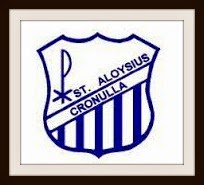Day 4 – St Aloysius Cronulla – David & Lauren.1
How are they using
data to inform decision making?
St Aloysius is very similar to our schools in their data
collection using the same methods and very similar tests i.e. ACER, BERT, Torch
etc.
They store this data in a central excel document in which
this updated so they can track the progress of students and the grades and
address needs when necessary.
With their maths programs in particular they pretest to
determine their maths groups across the stages and then post test to see how
the children have progressed. From this pretesting they develop a core section
of students and an extension group. The extension group are withdrawn and extended
in the particular area of a fortnightly cycle. The core group gather in the hub
where they have a group session on explicit teaching then. They are split into
smaller groups to cater for individual student needs. With children at risk
being targeted more closely and more directed activities to assist these
children.
 |
| Literacy Group working on a Google doc |
 |
| Year 6 Working Collaboratively |
When collaborative groups are in action students are
encouraged and directed to different groups to enhance their learning, with the
teacher having in mind the ability of the students. However it is evident that
the majority of students make positive choices of their own accord most of the
time.
What approaches are
taken to cater for the diverse range of student learning needs?
Stage maths
St Aloysius is a single stream school and therefore has had
to be creative in creating flexible learning groups to cater for the diverse
range of students academic needs. Stages 2 and 3 have created flexible maths
groups across the stage. Students are pre-tested for each concept and grouped
into an extension and a core group. The extension group is taught in both
stages by the Assistant Principal. The staff have expressed how beneficial
grouping the extension students together has been as it has catered for their
learning needs but also reduced the number of students in the class (every
class at St Aloysius is approx 33 students). The core group works in the
learning hub and is taught by the stage teachers. Within the core group
students are broken into smaller ability based groups to complete activities.
Morning maths club
Each Wednesday morning at 8.15am the Assistant Principal and
Year 6 teacher work with a group of students in maths club. This club was
created as a support group for students requiring additional practise of number
skills. Students were nominated by class teachers and a note was sent home to
parents. Year 6 students assist running the club as peer tutors. The morning
begins with a maths warm up (generally a counting activity eg counting races).
Students are then broken into grade groups and work on number games with a Year
6 student working wih each group. The morning concludes with a game. We
witnessed a game "Gladiator Challenge", similar to a shoot out style
game.
Reading Recovery
Reading Recovery runs Monday- Friday in the morning.
Flexible learning spaces
Flexible learning spaces are used to cater for students
individual choices of work areas. A number of options are provided to students
from kneeling, laying, sitting on the floor or at a desk. These are also
intentionally designed by the teacher to cater for their lesson needs.
Multimodal lessons
Multimodal lessons are used to engage students in meaningful
learning experiences. The teachers recognise that students learn in a variety
of ways and utilise a range of modes when teaching to meet these needs.
 |
| Gladiator Challenge |
 |
| Maths Club Game |
 |
| Maths Club Activity Folder |


















Again, thank you for the full comments and your response to the essential question. Are things like the Morning Maths Club able to be considered in your school situation? Your photos show a variety of supportive tools that are used by the students, not just technology. Are you confident that teachers in your situation are using a wide variety of learning tools and activities that will cater for individual needs? These are the sorts of conversations you need to have with the leadership team when you return.
ReplyDeleteSpecial thanks for engaging in this professional experience. We trust you have found it beneficial and of lasting value. The final step is to make sure you get time back at your home school to discuss the things you have seen. Paul
It looks like you have seen a wonderful variety of contemporary learning practices. I look forward to hearing how we can implement some of these at our school.
ReplyDeleteEnjoy your last day.
Loving reading up on your experience Dave and Lauren. Particularly love the sound of the Maths club, completely encapsulating the idea that we must "do whatever it takes!" Would love to hear about any other interventions that they have in place to target students who are not showing desired growth.
ReplyDelete